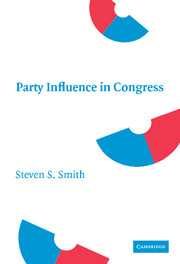Book contents
- Frontmatter
- Contents
- Acknowledgments
- 1 Introduction
- 2 The Microfoundations of Theories of Congressional Parties
- 3 The Types and Sources of Party Influence
- 4 The Search for Direct Party Effects
- 5 Recent Theories of Party Influence: Cartel and Conditional Party Government Theory
- 6 Revisiting Pivotal and Party Politics
- 7 Reexamining the Direct and Indirect Influence of Party in the House and Senate
- 8 More Than a Conclusion
- Appendix
- References
- Index
5 - Recent Theories of Party Influence: Cartel and Conditional Party Government Theory
Published online by Cambridge University Press: 05 June 2012
- Frontmatter
- Contents
- Acknowledgments
- 1 Introduction
- 2 The Microfoundations of Theories of Congressional Parties
- 3 The Types and Sources of Party Influence
- 4 The Search for Direct Party Effects
- 5 Recent Theories of Party Influence: Cartel and Conditional Party Government Theory
- 6 Revisiting Pivotal and Party Politics
- 7 Reexamining the Direct and Indirect Influence of Party in the House and Senate
- 8 More Than a Conclusion
- Appendix
- References
- Index
Summary
Observant political scientists look for patterns and trends in the contemporary Congress and try to identify the generalizations that explain them. During the time I have followed congressional politics closely, we have witnessed two waves of change in the political of the House of Representatives that motivated explanatory efforts. In the first wave, stretching from the mid-1960s to the mid-1970s, the committee-oriented, chairman-dominated politics of the mid–twentieth century was challenged by liberal Democrats, who required chairs to stand for election in the party caucus, forced the creation of subcommittees with real policy-making capability, and enhanced the influence of the Speaker over the referral of legislation to committee and over the floor agenda. Hyperdecentralization was the theme of writing about the effects of the first reform wave. In the second wave, from the late 1970s to the present, House party leadership asserted even more control over the agenda and often directed the details of the policy-making process in the House. Centralization was the theme of political scientists writing about the postreform wave.
Many political scientists contributed to our understanding of the reform and postreform eras. Dodd and Oppenheimer's 1977 edited volume, Congress Reconsidered, did more than any other book to review and interpret the reform era and its consequences (Dodd and Oppenheimer 1977). A key theme of the essays in the book was that weakening institutional capacity of a more decentralized Congress in the face of many challenges – the energy crises, environmental challenges, and so on – that required large, integrated, coherent legislation that only effective central coordination by party leaders could provide.
- Type
- Chapter
- Information
- Party Influence in Congress , pp. 114 - 147Publisher: Cambridge University PressPrint publication year: 2007



